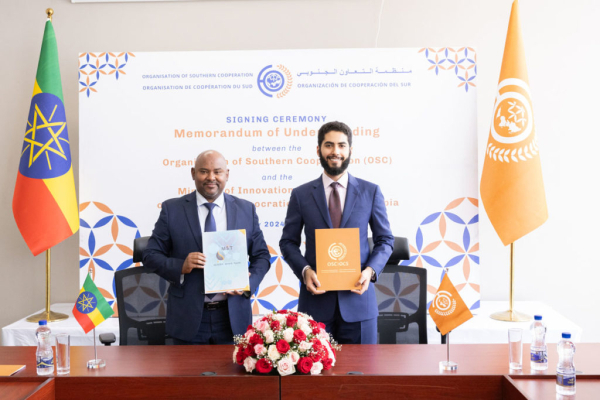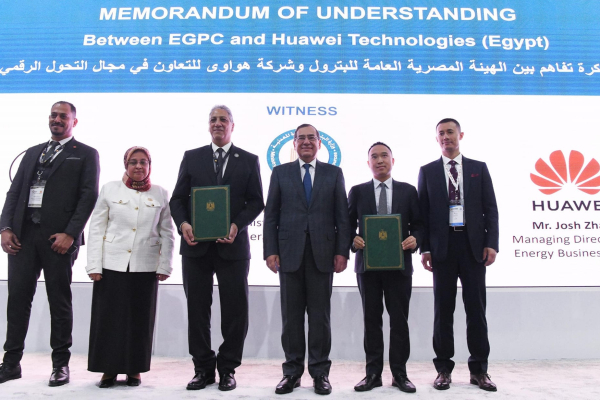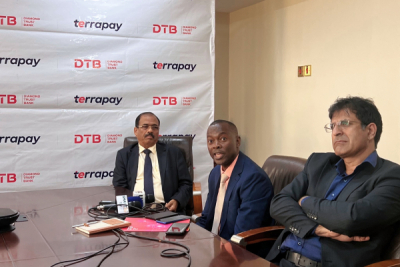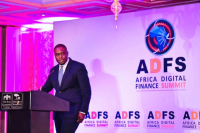In Africa, accelerating digital transformation necessitates tight cooperation among various stakeholders, leveraging their collective knowledge for faster progress.
The Southern Cooperation Organization (SCO) and the Ethiopian Ministry of Innovation and Technology have signed a memorandum of understanding to strengthen their collaboration in science, technology, innovation, and digitization. The agreement, signed on Tuesday, February 20, marks the beginning of a strategic alliance aimed at accelerating digital transformation, enhancing capabilities, sharing expertise, and promoting youth exchange initiatives.
The partnership will establish capacity-building initiatives for the Ministry’s professionals and public servants, leveraging the SCO’s resources and expertise. It will also provide new opportunities for youth through educational programs and scholarships, with a particular emphasis on science and technology disciplines.
This partnership is expected to be a key driver for the advancement of Ethiopia’s digital infrastructure, enhancing public services and strengthening key economic sectors through technology. It represents a significant step towards achieving the nation’s digital roadmap, “Digital Ethiopia 2025,” which aims to digitize over 300 services by 2025.
At the same event, OCS Secretary General Sheikh Manssour Bin Mussallam introduced the Greater South Learning Enrichment Resources Nexus (GreSLERN) digital platform. This open-source digital tool is designed to assist educators in member states and curriculum development centers in implementing a comprehensive and inclusive educational approach.
Samira Njoya
Chinese tech giant Huawei is emerging as the preferred partner for African nations seeking to transition into the digital age. The company is rapidly expanding its strategic alliances with both governments and corporations across the continent.
Wael Lotfy, Chairman and CEO of Enppi, an Egyptian oil and gas company, signed two memorandums of understanding with China's Huawei at the Egypt Energy Show, held in Cairo from Monday, February 19 to Wednesday, February 21. The aim is to boost the transition to digital, green energy.
"We consider Huawei a major partner in providing the latest solutions, digital technologies, and modern smart solutions to accelerate the pace of digital transformation in the energy sector, and enhance the production of digital and green energy, in line with the strategic goals of the energy sector with Egypt’s 2030 vision," said Wael Lotfy.
The first document was initialed with Huawei Egypt Digital Power Business, the Egyptian subsidiary of the Chinese supplier of digital power products and solutions, which will provide integrated energy solutions such as low-carbon data centers and photovoltaic power solutions. The second memorandum of understanding was signed with Huawei's local subsidiary, to stimulate the digital and technological transition among Enppi's projects by merging the expertise and smart technologies offered by the Chinese company.
The transition to clean energy is an important component of the development process. It is important to take this variable into account, and these new arrangements will enable Egypt to significantly reduce its greenhouse gas emissions in the power and oil sectors.
Adoni Conrad Quenum
Djibouti is preparing to conduct its third population census, 15 years after the last one in 2009. The government and its partners are working hard to ensure that this first digital census is carried out under the best possible conditions.
On Thursday, Feb. 22, Djibouti’s Institute of Statistics INSTAD received a donation of 1,400 tablet devices from Egypt's government. These new tools are crucial for preparing the upcoming digital population census in the nation, aiming to enhance efficiency in data collection and management.
Djibouti's Institute of Statistics (INSTAD) received a donation of 1400 tablets from Egypt on Thursday, aiding its preparations for the upcoming nationwide digital census.
"These tablets will enable us to carry out our 2.0 census," said INSTAD Director Ibrahim Abdi Hadi, emphasizing the equipment's importance for efficient data collection and storage.
The donation underscores the ongoing partnership between Egypt and Djibouti. It also aligns with Djibouti's commitment to improving data quality for sustainable development and its goal to leverage technology for national progress. The digital census aims to modernize operations and position Djibouti as a regional leader in demographic statistics.
Samira Njoya
British financial technology firm TerraPay announced today an agreement with Diamond Trust Bank Uganda (DTB Uganda). The agreement aims to develop international money transfers and enhance financial inclusion in Uganda.
Telecommunications giant Orange Group, operating in 18 countries across Africa and the Middle East, is ramping up its efforts to accelerate digital transformation through technology competitions. These initiatives aim to support promising projects and foster innovation in its markets.
Jordanian healthcare technology startup OptiGuide emerged victorious at the first international Orange Summer Challenge (OSC) grand finale on Tuesday, February 20.
The competition saw national winners from eleven African and Middle Eastern countries compete for the top prize, awarded during a ceremony organized by Orange Middle East and Africa (OMEA) in Casablanca, Morocco.
OptiGuide's six-member team impressed the jury with their proposal: an intelligent assistance bracelet designed for the visually impaired. This assistive technology, paired with an AI-powered mobile application, improves user safety by providing real-time identification of obstacles and potential dangers.
The OSC is a three-month internship program organized by Orange Digital Centers. Young talents compete by proposing technological projects within various sectors, aligned with a specific theme. This year's theme, "Artificial Intelligence and the Internet of Things: a winning duo to meet tomorrow's challenges," attracted 253 participants across the region with a total of 46 innovative tec projects proposed, tackling challenges in sectors like environment, health, education, and agriculture. Notably, all participants had access to Orange Digital Centers, free-access infrastructures offering training and support for those seeking to develop their digital skills or pursue digital career paths.
Adoni Conrad Quenum
Recognizing the critical need for collective action, African nations are increasingly forming partnerships to combat the growing threat of cybercrime. Stakeholders from both the public and private sectors are joining forces to strengthen defenses and create a safer digital environment across the continent.
The African Criminal Police Agency (AFRIPOL) and cybersecurity specialist Group-IB signed a memorandum of understanding on Tuesday to bolster collaboration against cybercrime across the continent.
AFRIPOL Acting Executive Director Jalel Chelba (photo, right) hailed the agreement as empowering "African countries to tackle cybercrime with greater effectiveness and efficiency, thereby boosting confidence in the African cyberspace."
Under the partnership, Russian firm Group-IB will share its expertise in cyber investigations, reverse engineering, and incident management with AFRIPOL personnel throughout Africa.
Joint initiatives will focus on cyber threat monitoring, fraud, phishing prevention, tracking compromised payment details, and raising awareness.
The move underscores both parties' commitment to strengthening cybersecurity in Africa, a region estimated to lose $3.5 billion annually to cyberattacks, according to a June 2023 report by US consultancy Kearney. The report also highlighted the region's low cyber resilience level.
Samira Njoya
While venture capital funding in Africa's technology sector was down in 2023 compared with 2022, local initiatives are being put in place to give fresh impetus to the sector, which remains attractive.
Egyptian venture capital firm Sawari Ventures announced plans to launch a $150 million fund dedicated to financing Egyptian startups, aiming to revive the country's tech ecosystem amid a broader funding slowdown.
The announcement, made on Monday by co-founder Hani Al Sanbati, highlights Sawari's commitment to investing in sectors with potential growth, including fintech, edtech, healthtech, green tech, and deep tech. The firm has already supported over 500 startups across the Arab world since its inception in 2010.
This initiative comes at a critical juncture for African tech funding, with investments declining across the continent, including in Egypt, one of the region's most established ecosystems. According to Partech Africa's "2023 Africa Tech Venture Capital" report, Egyptian startups raised $433 million in 2023, a 45% drop from the previous year.
Adoni Conrad Quenum
Morocco has made significant progress in its digital transformation. In a bid to better cater to its population, the government has enlisted the support of the United States, a leading nation in digital development.
A Moroccan delegation led by Sarah Lamrani, Secretary General of the Ministry of Digital Transition and Administration Reform, recently concluded a week-long visit to the United States aiming to strengthen digital cooperation.
The visit, initiated by the US Trade and Development Agency (USTDA), saw delegations meet with executives from around 20 US technology companies and local startups, including IBM, Microsoft, and Google Cloud Services. Discussions focused on potential partnerships in fields like e-government, cloud computing, and cybersecurity.
"The goal was to explore collaborations with American companies to develop and strengthen our digital ecosystem," stated Lamrani. It aligns with the country’s 2030 digital strategy, which is currently being finalized.
The Moroccan delegation presented the key goals of their digital transformation plan, highlighting achievements in areas like human capital development through collaborations with companies like Microsoft and Oracle. They also highlighted opportunities for US companies seeking expansion in emerging markets.
This visit builds upon the existing relationship between the US and Morocco in the information and communication technology (ICT) sector. US companies have already played a significant role in contributing to Morocco's digital development.
Samira Njoya
The third edition of the Africa Digital Finance Summit, organized by pan-African public relations agency Glass House PR, will be held in Johannesburg, South Africa. Traditionally hosted in Kenya, the event will take place from Wednesday, November 20 to Saturday, November 23, 2024.
Key topics on the agenda include digital transformation, artificial intelligence, climate change, cybersecurity, and financial inclusion.
Africa's digital landscape is undergoing a rapid transformation, fueled by a surge in mobile phone adoption. By 2022, the Sub-Saharan region was boasting 489 million unique mobile subscribers, translating to a 43% penetration rate.
Ghanaian President Nana Akufo-Addo urged African Union (AU) members to adopt a continent-wide mobile interoperability system, arguing it would boost trade and financial inclusion amid rapid digital transformation.
Speaking at the 37th Ordinary Session of the AU Assembly in Addis Ababa, Akufo-Addo said such a system would accelerate the implementation of the African Continental Free Trade Area (AfCFTA) by facilitating seamless cross-border transactions and potentially eliminating roaming charges.
If implemented, the initiative “can truly and meaningfully fast-track the inclusive realization of the AfCFTA,” he stated.
His push echoes sub-regional efforts toward similar goals. The Southern African Development Community (SADC) is pursuing a single network area (ONA) for a unified digital market, while the East African Community (EAC) and Economic Community of West African States (ECOWAS) are implementing comparable projects.
ECOWAS members Ghana and Côte d'Ivoire already abolished roaming charges within their borders in July 2023, following regulation C/REG.21/12/17. Benin, Togo, Mali, and Burkina Faso are also working towards compliance.
Once implemented, the interoperability of cell phone networks in Africa should facilitate communications between the continent's countries, notably by reducing costs. It is also expected to drive economic integration and empower marginalized communities within the growing digital landscape.
Isaac K. Kassouwi
More...
Envisage Incubators is committed to guiding innovators from ideation to commercial success. With a network of mentors and resources, it provides a nurturing environment for Rwandan startups.
Established in 2019, Envisage Incubators supports early-stage agritech startups in Rwanda, guiding them from initial concepts to revenue generation. The incubator's mission aligns with the broader goal of achieving sustainable food security for Africa's growing population.
Led by Patrice Habinshuti (COO), Vincent Forsman, Victor Lindahl, Ronny Eriksson, and Deo Mutambuka, Envisage provides dedicated workspace and resources to its startups. A network of mentors, organizations, universities, and experts helps entrepreneurs find solutions and navigate challenges.
The team, composed of young Finnish and Rwandan students and entrepreneurs, fosters Rwanda's development through incubation programs. Coworking spaces facilitate collaboration, experience sharing, and idea validation, fostering a supportive community.
Envisage equips startups with the skills and resources needed to turn their concepts into reality. Its training programs help them become problem-solvers and efficient doers while capacity-building workshops aim to make them bankable.
Thanks to its strategic partnerships, it provides access to machinery and tools for prototyping and product improvement, enabling continuous innovation.
Melchior Koba
Sexual and reproductive health is still a taboo subject in African societies. To help women a little, a doctoral student in medicine decided, with her team, to set up a bespoke solution for women.
"Elles" is a digital solution developed by a group of young Beninese led by Viviane Oké (photo), a Beninese doctor completing her training at the Faculty of Health Sciences in Cotonou. It enables access to sexual and reproductive health information and services via a mobile application.
First launched in November 2022 –the official launch is slated for March 30, 2024– the Android app currently boasts over 2,000 users across 20+ African countries, primarily in the Central and West African regions. An iOS version is in development.
"We strive to reduce gender disparities in health, promote women's autonomy and fulfillment, engage men as allies in women's health, and bolster research on women's health and well-being," Viviane Oké told We Are Tech Africa.
Currently, the app can be downloaded for free on PlayStore (the iOS version is under development). Once downloaded, users can register on the platform by clicking "I don't have an account" and following the instructions. After registration, they have access to various services such as menstrual cycle tracking, information on contraceptive methods, family planning, sexually transmitted diseases and infections, and notification alerts for breast self-examination to prevent breast cancer.
According to Viviane, paid services will soon be added to the free services. She mentioned among other things the possibility for users to chat with healthcare professionals.
Adoni Conrad Quenum
A computer scientist, he aims to democratize digital skills by making the latest technological advances accessible to novices, while providing practical advice on how to navigate this ever-changing world.
In Rwanda, Cishahayo Songa Achille (photo) is a software engineer and tech entrepreneur who founded Techinika, an edtech firm established in 2020. The company aims to educate the general public, particularly those not versed in technology, about current advancements and practical applications within the field. By doing so, Techinika seeks to empower individuals and organizations with essential digital skills.
As Managing Director since March 2023, Achille oversees daily operations and leads the Techinika team during regular gatherings. His responsibilities include ensuring the realization of Techinika's goal of imparting contemporary digital knowledge across various sectors.
Achille obtained a high school diploma in computer networking from the Integrated Polytechnic Regional College (IPRC) in Kigali in 2019. Currently, he continues his education in information technology at IPRC, working towards earning an advanced diploma.
In January 2024, Achille joined forces with others to establish the African Soft Skills Organization, which focuses on enhancing self-confidence among technical students in Rwanda and throughout Africa by developing their professional abilities. Additionally, he serves as a full-stack engineer at Progress MiH, providing financial support for projects aimed at achieving corporate objectives.
Beyond these roles, Achille maintains a presence online as both a blogger and a YouTuber. Previously, he held positions at other technology firms, including serving as Technical Team Leader at Andela and Program Coordinator at Afflatus Africa in 2022.
Furthermore, Achille has been invited to speak at events like the She Can Code School in 2023 and served as Co-Organizer and Chairman of the Rise and Talk Gavel Club debate competition at the IPRC in Kigali. Moreover, he shared insights into artificial intelligence on Rwandan television channel TV10.
Melchior Koba
In a move to address challenges posed by ride-hailing apps like Uber and Bolt, Ghanaian authorities are launching a dedicated app for traditional taxi drivers, aiming to offer a competitive alternative and provide support to this established sector.
Ghana's "Tap N' Go" app, aiming to formalize and integrate the informal transport sector, officially launched on Monday, February 19, following an announcement by Vice President Mahamudu Bawumia.
Available on iOS and Android, the app caters to both users and drivers. Users can book rides from private cars or traditional metered taxis, while drivers receive alerts when their services are requested. This two-sided approach addresses user preferences and offers traditional taxi drivers a platform to compete.
The launch reflects the rapid digitalization of Africa's transport sector, driven by rising on-demand mobility applications. According to Partech Africa data, African mobility startups secured $48 million in 2023 alone. Statista projects "Ride-hailing & Taxi" sales on the continent to reach $4.13 billion in 2024.
"The launch of this app," said Nana Nimako Asiamah, National Chairman of the Ghana Private Road Transport Union (GPRTU), during December's testing phase, "is a timely intervention to save our business." Before its official launch, Tap N' Go underwent trials in several Accra neighborhoods, including the Airport, East Legon, and Dansoman.
Adoni Conrad Quenum















